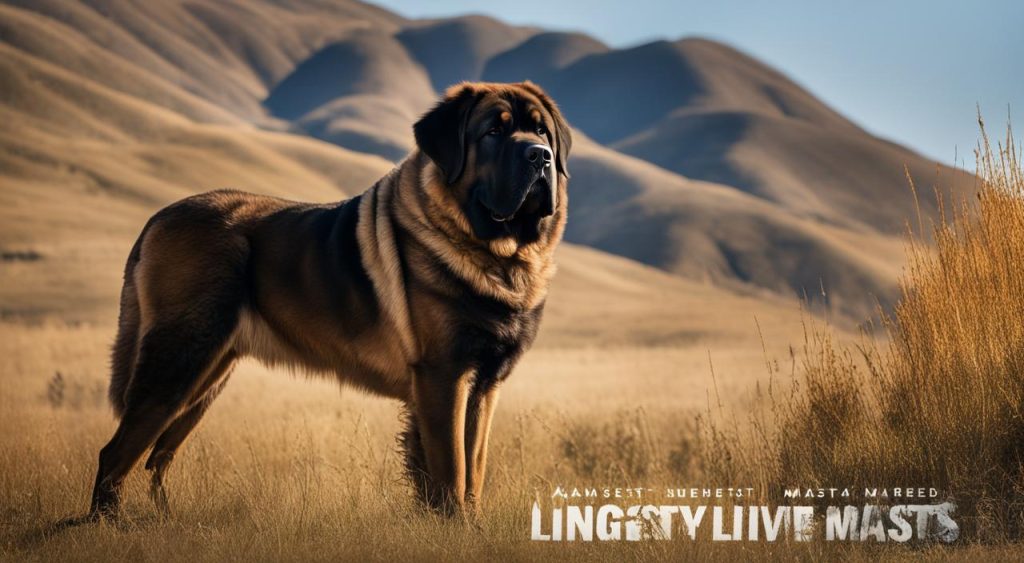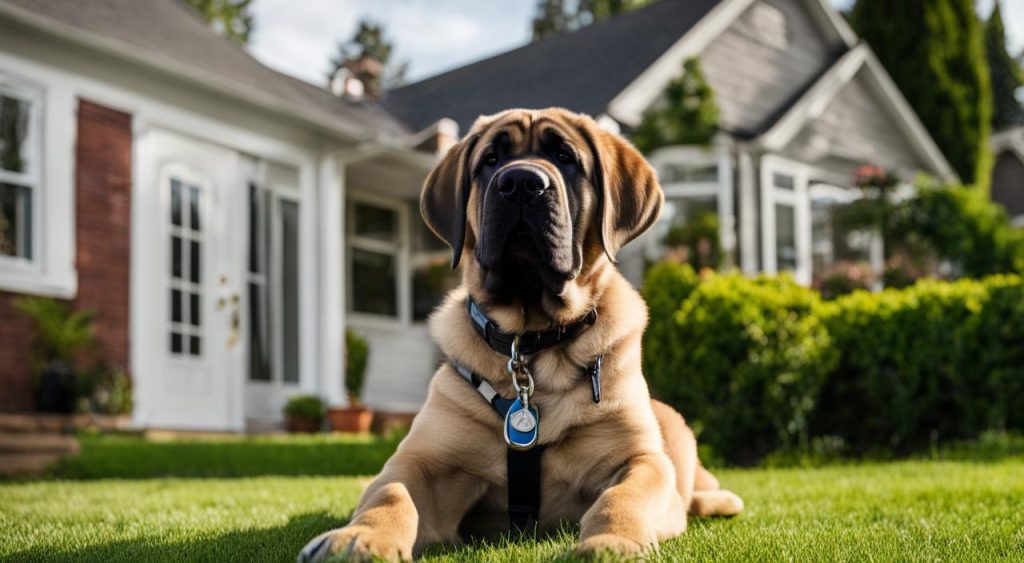Mastiffs are a group of large and majestic dogs that have been used as guard dogs, war dogs, and fighting dogs throughout history. Today, many Mastiffs are kept as beloved pets. One common question among Mastiff owners is how long their furry friends will live. The lifespan of Mastiffs can vary depending on the breed. There are several different Mastiff breeds, including English Mastiffs, Bullmastiffs, Neapolitan Mastiffs, Tibetan Mastiffs, Pyrenean Mastiffs, and Spanish Mastiffs. Each breed has its own average lifespan, ranging from 6 to 15 years. Factors such as size and genetics can also impact a Mastiff’s lifespan. It’s important for Mastiff owners to be aware of common health concerns in the breed, such as hip dysplasia, elbow dysplasia, arthritis, wobbler syndrome, dilated cardiomyopathy, hypothyroidism, and bloat. By providing proper care, nutrition, and regular vet check-ups, Mastiff owners can ensure their dogs live a long and healthy life.
Key Takeaways:
- There are several Mastiff breeds, each with its own average lifespan.
- Mastiffs can live from 6 to 15 years, depending on the breed.
- Size and genetics can affect a Mastiff’s lifespan.
- Common health concerns in Mastiffs include hip dysplasia, arthritis, and bloat.
- Proper care, nutrition, and regular vet check-ups can help prolong a Mastiff’s life.
Factors Affecting Mastiff Lifespan
The lifespan of a Mastiff can be influenced by various factors, including size and genetics. Size plays a significant role in determining a Mastiff’s lifespan. Generally, larger Mastiffs tend to have slightly shorter lifespans compared to smaller Mastiffs. This is because larger dogs age faster and may experience age-related health issues at an earlier age.
Genetics also play a crucial role in a Mastiff’s lifespan. Some Mastiffs may have a genetic predisposition to certain health conditions or cancers, which can impact their longevity. It’s essential for Mastiff owners to be aware of common health concerns in the breed, such as bone cancer (osteosarcoma), lymphosarcoma, and genetic predisposition to certain diseases.
By being proactive in detecting and treating these health issues early on, Mastiff owners can help prolong their dogs’ lives and ensure a higher quality of life. Regular vet check-ups and proper care are essential to monitor the overall well-being of Mastiffs and address any health concerns promptly. With the right attention and care, Mastiffs can live longer and enjoy a happier, healthier life.
Promoting a Long and Healthy Life for Your Mastiff
While Mastiffs may have a shorter lifespan compared to some other breeds, there are steps that Mastiff owners can take to promote a long and healthy life for their beloved pets. One important aspect is providing proper care for Mastiffs, including regular exercise to keep them physically active and mentally stimulated.
It’s also crucial to feed Mastiffs a high-quality diet formulated to meet their specific nutritional needs. A well-balanced and nutritious diet can support their overall health and help prevent common health issues. Consult with your veterinarian to determine the best diet for your Mastiff and ensure that you provide them with the appropriate portion sizes.
Mastiffs are prone to certain health issues, such as hip and elbow dysplasia, bloat, and heart problems. Regular vet check-ups are essential for early detection and treatment. Your veterinarian will be able to monitor your Mastiff’s health, administer necessary vaccinations, conduct routine tests, and provide guidance on preventive measures.
In addition to proper care and regular vet check-ups, responsible breeding practices are crucial to the overall health and longevity of the Mastiff breed. When looking to add a Mastiff to your family, choose a reputable breeder who prioritizes the health and well-being of their dogs. Responsible breeders conduct health screenings and genetic testing to minimize the risk of hereditary diseases.
By taking these proactive steps – providing proper care, a high-quality diet, regular vet check-ups, and selecting a reputable breeder – you can contribute to promoting the longevity and well-being of your Mastiff. Remember to shower your furry friend with love, attention, and a nurturing environment to ensure a happy and fulfilling life together.





